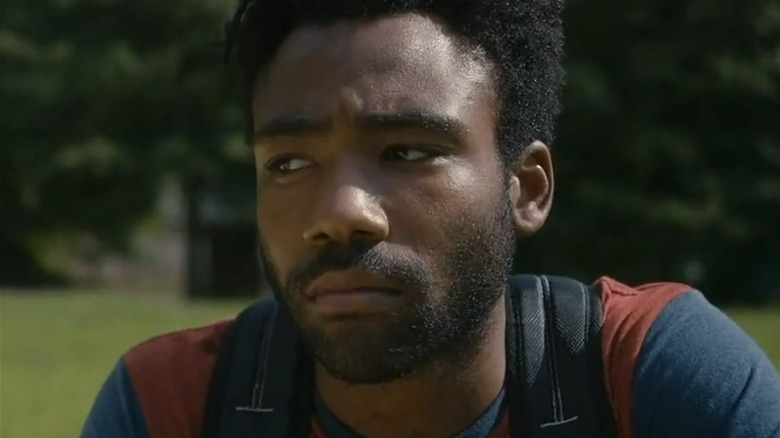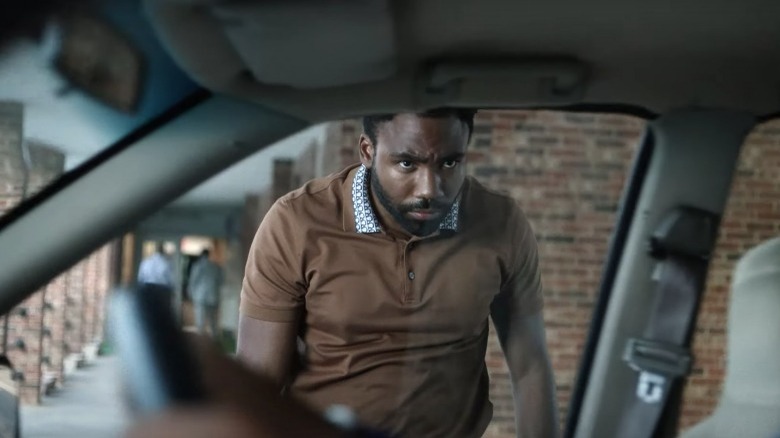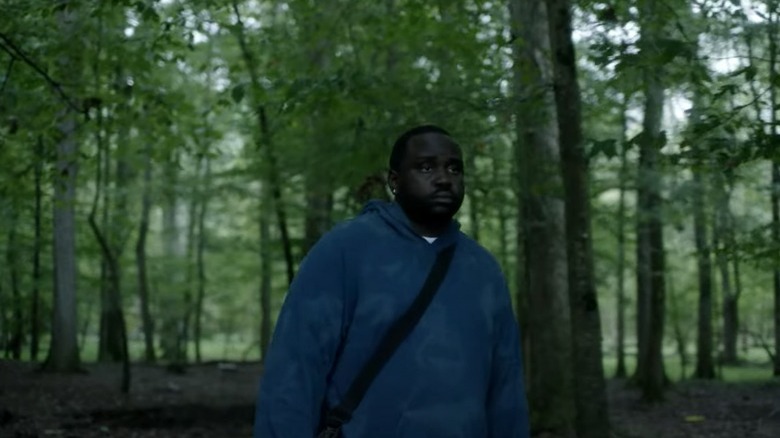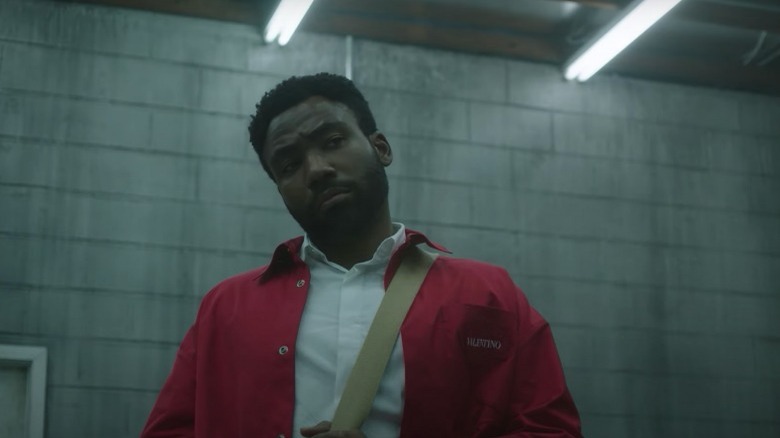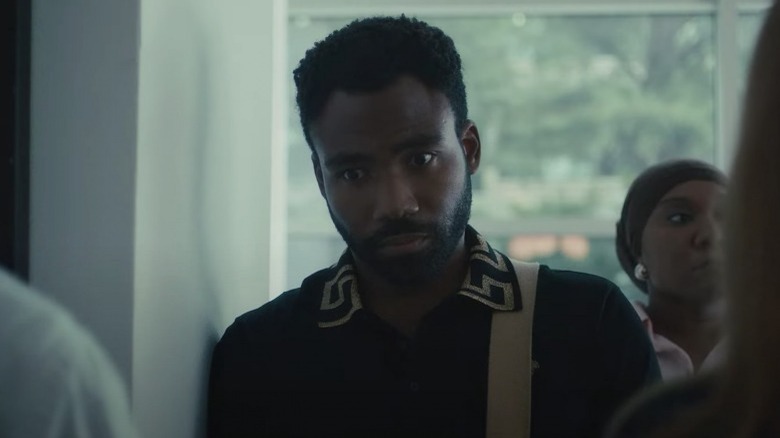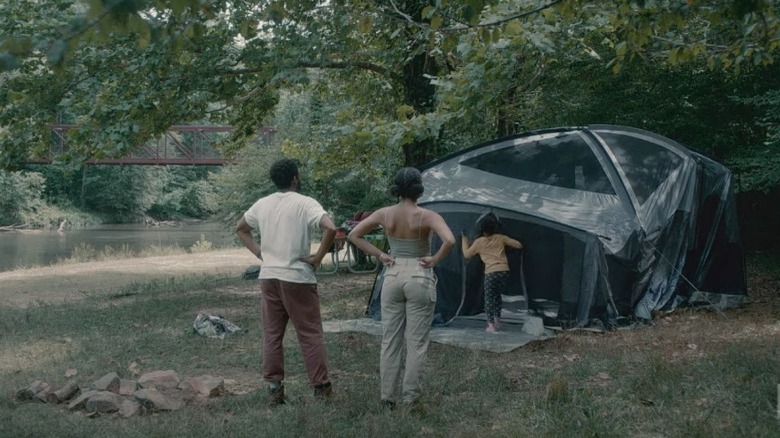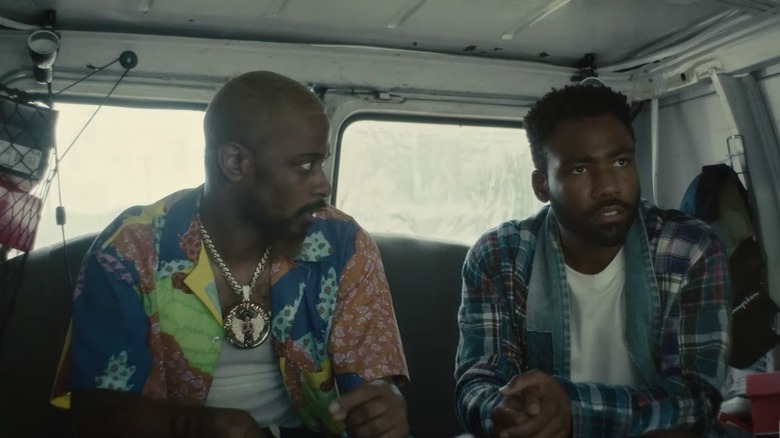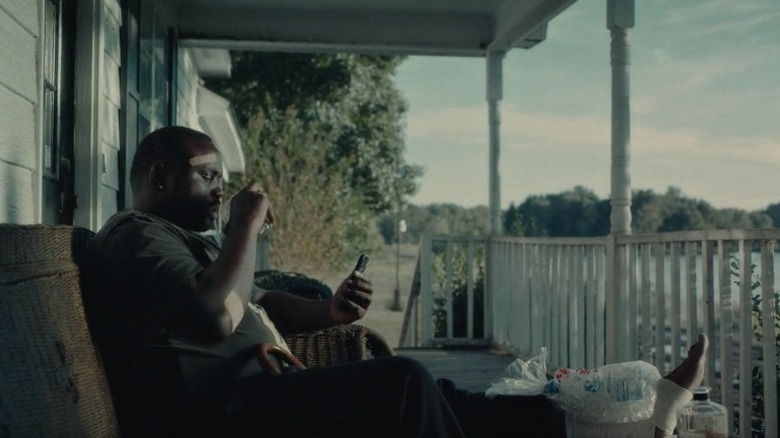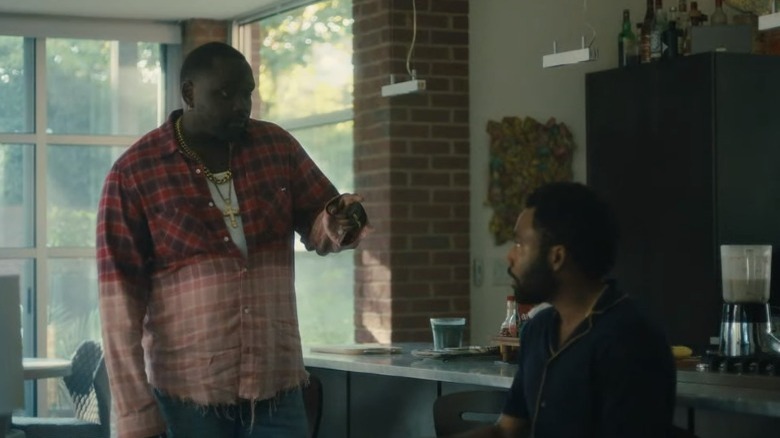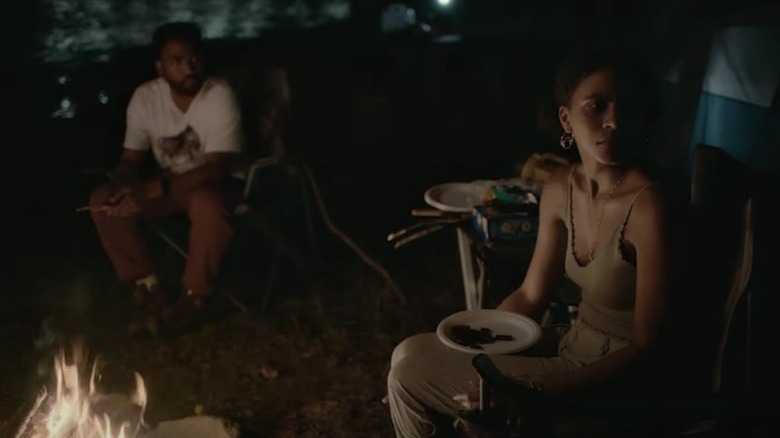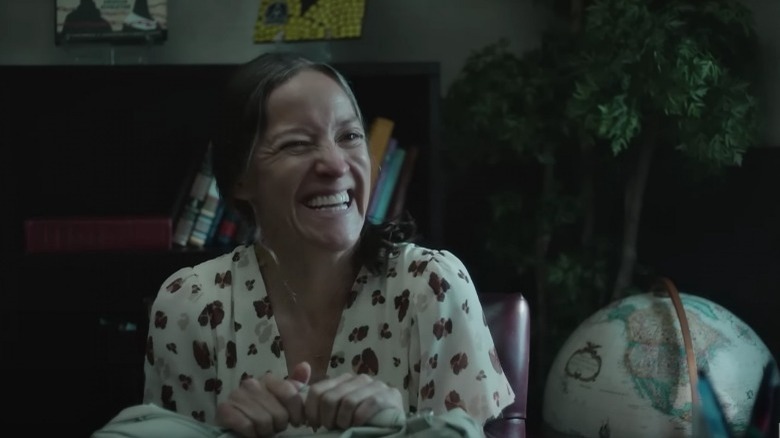Earn's 12 Best Moments From Atlanta Season 4 Ranked
After four awe-inspiring seasons, the finale of "Atlanta" says goodbye in a legendary fashion fitting for the phenomenal and subversive comedy. Donald Glover and his exceptional cast and crew take their final bow, sending their respective characters in stunning new directions. With memorable entries like a mockumentary about "A Goofy Movie," parody commercials built into the episode formatting (as seen in the Season 1 episode "B.A.N."), and complete departures from the main story (Season 3's standout 9th Episode), "Atlanta" has consistently been a wild but always engaging ride.
Social commentary and illuminating presentation are trademarks of the unconventional storytelling approach of "Atlanta." This element has led "Atlanta" to 25 Emmy nominations and six astonishing wins for a variety of aspects, including Donald Glover's directing for "B.A.N.," his performance as Earn, and Katt Williams' memorable guest starring role in Season 2 as Willy the Alligator Man. Hot off the finale, "Atlanta" could make a big splash in its final run and pick up even more awards for its unique filmmaking.
Season 4 featured plenty of hilarious, emotional, and revelatory scenes for our beloved "Atlanta" characters. From Darius' (LaKeith Stanfield) unforgettable face-off at Target to Vanessa's (Zazie Beetz) unnerving misadventure on the sets of Mr. Chocolate's exploitative films, and of course, Alfred's (Brian Tyree Henry) life-threatening farm day — the final season went out with a triumphant bang. However, Earn's growth throughout "Atlanta" has always been a joy to witness. To celebrate that, we've assembled and ranked his finest moments from the final season.
12. Earn's mother speeds off with his grandfather
Earn's interactions with his sometimes dysfunctional extended family cement Season 4's overarching theme of home. In "Light Skinned-ed," a family gathering after church brings together a bunch of Atlanta's finest locals — including Earn's mother Gloria (Myra Lucretia Taylor), his grandfather (Bob Banks), and Aunt Jeanie (Michole Briana White) — who seem to be feuding amongst each other. After dropping off Earn and his aunt, his mother shockingly speeds off with his grandfather.
The episode unpacks the family's dynamics and inability to properly communicate with each other. Gloria claims Jeanie is keeping their father from her in an attempt to justify her sudden exit. Episode 4 highlights and continually circles back to Jeanie's dramatic behavior and feelings of exclusion from the family. An enlightening group call (which brings back Katt Williams' Emmy-winning role) showcases her righteous feelings as the sole light-skinned member, which the rest of the family howls tears of laughter over. It's a ridiculous notion, which they point out, explaining that they dislike her for her controlling and even evil actions, as they put it.
Earn's part in all this, as an unwilling accomplice and witness, could be a metaphor for generational trauma as he inherits this complicated mess of relationships. It also displays the obstacles first-generation students face when trying to break negative cycles, presented in the fresh and lively way "Atlanta" is known for.
11. Earn calls Paper Boi and asks if the farm is boring
Though he often means well, Earn has a habit of getting on Al's easily agitated nerves. His eagerness and determination to prove himself as Paper Boi's manager drive their complicated working relationship while balancing their familial one. This is highlighted exceptionally in the series' penultimate episode, "Andrew Wyeth. Alfred's World." when Earn calls while Alfred is decompressing.
After a series of bizarre misadventures, including mentoring talentless cultural appropriators and his intense mall shootout, Al is camping out at a secluded farm for some much-needed rest and relaxation. He's blowing off steam with a semi-automatic rifle, annihilating trees and targets without discretion, when Earn abruptly calls. It's in tune with Earn's annoying habit of calling or being at the wrong place at the wrong time, leaving Al to ignore the incessant buzzing.
Earn repeats this when he ironically calls immediately after Al's harrowing incident with the wild hog. He phones about mundane work stuff like contracts and lawyers, which obviously isn't nearly as pressing as Alfred's current bloody state. Surprisingly, Al's new lease on life leaves him grateful to hear his cousin's voice even with boring news. His overall attitude is also a subtle indicator of Al's growing ego and lack of patience, which he continually works on as he learns to appreciate Earn more. We even circle back to this at the end of the episode when he reaches out to Earn in a loving moment.
10. Earn guides Vanessa out of Atlantic Station
The opening episode of the season, "The Most Atlanta," opens with a jaw-dropping sequence reenacting some of our nation's extremely divisive events. The episode then takes a turn by following a seemingly uninteresting errand that becomes anything but when Earn drives Vanessa to Atlantic Station to get her phone fixed and meets some familiar faces along the way.
Of course, it is only natural that when you return home you tend to run into an old friend or two from back in the day. The normal seeming occurrence strikes Earn and Vanessa an uncomfortable amount of times before things start to get sinister. In an eerie twist reminiscent of "The Twilight Zone," the station becomes a destination itself as it traps lost souls within. The allegorical representation of feeling stuck in your hometown leads to a revealing moment for Earn.
After an uncomfortable wave of ex-relationship sightings, Earn and Vanessa start to feel claustrophobic and try to leave the spiraling station. The two panic at the thought of being trapped, especially with their daughter Lottie to get back to. They find a dark and terrifying exit that they dare follow to the very end. Before they do, Earn has some moving words for Vanessa when he says, "I would never let you become one of them. You know that, right?" Earn's revelation at the thought of Van becoming one of his forgotten exes speaks volumes of his unfaltering love for Van.
9. Earn's adventure to sign D'Angelo
In "Born to Die," Earn finds himself in a mind-numbing management meeting where the team has come together to help a white woman in crisis. After pulling a gun on a young Black boy selling chocolate, fictional author Lauren Loughty's book sales for "I Was Wrong" begin to decline when she is sued. The managers scramble for a salvageable angle when Earn mutters something under his breath about getting a different signee.
This causes the lead of the meeting to rear his head towards Earn and condescendingly challenge him to sign a notable artist instead, which he humbly accepts. He declares he can get D'Angelo and confidently struts out of the room. Curiously, he actually has a contact that may have a lead on the elusive musician. Oddly enough, this takes Earn on his own scavenger hunt, similar to Al's in the premiere episode. He waits in a grim cinderblock room before finally succumbing to the maddening circumstance (Dasani water?!) and lashes out at the receptionist. Following a bit of much-needed meditation and transcendence, Earn is granted access through another dark passageway.
Though he doesn't find D'Angelo, he receives some enlightenment through a peanut butter christening (in Simba style, poking fun at Glover's 2019 role in "The Lion King"). The mysterious man recalls Earn's anxiety-ridden dream from the series premiere where unidentifiable hands reach out for him. His wisdom helps Earn shift his perspective and grow even more.
8. Earn tries to assemble the oversized tent
To make Lottie's birthday weekend as special as possible, Earn spares no expense. He rents out the entire campground and purchases an extravagant 12-person tent so each family member can have their own spacious room. While Earn's heart may have been in the right place, Vanessa points out they'll be freezing if they do because when camping at night, body heat is a crucial element of staying warm.
The lack of insulation is lost on Earn in this informative moment emphasizing one of Season 4's key themes. The idea that money, success, and fame can't solve all your problems may ring cliché. However, under the subversive lens and distinctive formatting choices of "Atlanta," this nostalgic return to tradition is prominent and refreshing.
The uplifting sequence is even more touching when you consider how far Vanessa and Earn have come together since Season 1. From co-parenting Lottie to growing far apart emotionally and physically before traveling to Paris together on a world tour, the couple's return to each other is celebratory and natural. The final season's ability to slow down the experimental narrative to tell a traditional family story is also a wonderful testament to the commendable versatility of "Atlanta" and its groundbreaking television structure.
7. Earn and Darius pay the Shoe Man
If Paper Boi's worldwide success has taught "Atlanta" viewers anything, it's that money can't buy everything. This invaluable life lesson is evident when Darius and Earn meet with the peculiar Shoe Man in "Crank Dat Killer." The awkward exchange between friends also serves as essential comic relief while Al learns this moral the hard way.
In a rare depiction of violence, "Atlanta" mirrors our world when a shooter opens fire in a crowded mall targeting Paper Boi. Simultaneously, Earn and Darius find themselves in an extremely strange situation when the Shoe Man demands an alternative form of payment. Rather than any dollar amount, his request is to see the two young men kiss — stupefying the pair, who'd much rather just pay money.
"Atlanta" brilliantly and unsurprisingly avoids homophobia within their reluctance. Earn brings up the point of sacrificing dignity coupled with the already insanely high value they place on trendy footwear. He reiterates to Darius that they're above this as they pucker up anyway. Earn's ability to put his own needs and comfort aside for others isn't something he's been prone to do in the past. This is yet another sign of his character development and personal growth following his experiences in therapy. The Shoe Man's shocking and untimely demise is the dark cherry on top of this exceptional sequence.
6. Earn's heartwarming FaceTime with Al
Alfred's weekend getaway on his safe farm nearly takes his life on more than one occasion. His hard work pays off when the dead tractor on sight finally roars back to life — then nearly crushes him to death when it topples over. A smashed foot leaves Al to limp and crawl back to his farmhouse, where he's attacked by a surprising assailant.
The wild hog that has been munching on his budding marijuana crop rears its ugly head at Al's bloody foot. The giant pig charges aggressively at Al, putting him in a fight for his life against nature itself. Lucky for Paper Boi, his brand new cast iron skillet just arrived from Amazon, which he uses to pummel the swine and then fry up some juicy bacon.
As Al enjoys the fruits of his extreme labor, he returns Earn's call via FaceTime so they can actually see each other in a more meaningful way. Earn brings even more irony with him when he warns Al about the dangers of farms and isolation (which Al's clearly aware of by now), adding a subtle hint of the show's trademark humor. With sweeping music, they lovingly joke back and forth as Earn reminds Al he can always come home because "Atlanta's not going anywhere" — a sentiment which beautifully ties in with the final season's theme of home.
5. Earn unpacks his Princeton trauma
Earn's deep insecurities are intentionally left unexplored until the Season 4 episode "The Homeliest Little Horse." The series also shrouds Earn's short time at the prestigious Princeton University which led to his heightened anxiety and depression in mystery. This also brings about extremities within Earn like severe pettiness, which he demonstrates throughout the episode.
Earn's resentment is triggered when his alma mater invites him to speak at their university. He responds with a righteous demand for an honorary degree which they unexpectedly oblige, but even that doesn't satisfy him. He opens up to his therapist Everette Tillman (Sullivan Jones) in an authentic representation of mental health care that uncovers Earn's tragic events at Princeton. He goes into his experience as a residential advisor with a white student named Sasha who offers to do him a favor. She kindly stashes his stylish suit for an upcoming job interview but then betrays his trust by ignoring his requests to retrieve it. When he finally uses his master key to get it, she reports him to the Dean.
Princeton's swift response is unreasonably harsh, dripping with racial bias and incendiary language. They hurtfully insinuate Earn is an intruding predator, prompting his exit from the school. His therapist notes this triggers his childhood abuse where Earn was traumatized and made to feel powerless. This revelation results in a heartbreaking moment of vulnerability for Earn.
4. Earn's ode to Al MacDonald
The final episode goes out with a blast of laughs and jaw-dropping surprises. We open by setting up Darius' sensory deprivation tank storyline before segueing into a side-splitting exchange between Earn and Al. Earn seizes the opportunity to poke fun at both Al's flannel and his disastrous farm experience to the tune of "Old MacDonald Had a Farm."
They share expletives and chuckles while rapping along with each other, displaying the closeness of their relationship. This slows the season down before we say goodbye, celebrating the two and how much they've grown since the explosive gunshot that kicked off the pilot episode. It's also a necessary beat we're grateful "Atlanta" takes before the finale's wild antics ensue.
It may be a small moment, but it is one that speaks volumes about the authentic love these two have for each other, expressed through their ability to tease one another. It's a trait commonly associated with brotherly relationships, and that bond links the two cousins even closer.
3. Earn tells Vanessa he truly loves her
"Snipe Hunt" slows "Atlanta" down in the most gorgeous way imaginable by taking Earn, Vanessa, and Lottie (Austin Elle Fisher) on a family camping trip in the woods. The episode utilizes a tighter aspect ratio to literally bring the trio closer together in a plethora of sentimental scenes. As Lottie explores the wilderness, Van and Earn explore their possible future together, which leads to a riveting confession from Earn.
He's moving to Los Angeles for work and extends an invitation to Vanessa and Lottie to come with him. With Hiro Murai's exquisite directing, "Atlanta" captures the family's close bonding through s'mores, hikes, and the titular snipe hunt. Earn's commitment to making Lottie's birthday weekend memorable underlines his shifting priorities from wealth and success to family. Now that he's no longer struggling, he's able to look up and reflect on what's truly important.
This leads to a heartfelt conversation where Earn finally unveils his true feelings to Vanessa. He tells her that he loves her entirely and it's far more than her being the mother of his child. He wants them to be a family. This profession is a tear-jerking scene that Vanessa accepts as her eyes well up and she hugs the tear-filled Earn. It's the happy ending we'd hoped for since the pilot episode and "Atlanta" circles back to it wonderfully.
2. Earn orchestrates Lisa's storytelling demise
One of Earn's most hysterical antics in Season 4 is his elaborate scheme to bamboozle and devastate an unruly airport clerk who refuses to accept his wrinkled passport in "The Homeliest Little Horse." After a great deal of interior debate, the Princeton alum begrudgingly accepts an invitation from his former school and decides to make a family trip out of the occasion. This decision is critical as it illustrates Earn's profound new top priority — his family with Van and Lottie.
It also makes Lisa Mahn's (Brooke Bloom) racist behavior even more unbearable when she prevents Earn from boarding the plane. In a brilliant withholding of information, "Atlanta" follows Mahn as she quits her job to pursue her dreams of being a writer. After a literary agent contacts her online, she has a seemingly unresolvable fight with her best friend, dumps her savings into her children's book, and is ultimately humiliated in public, all at the orchestration of Earn and his paid actors.
It's petty to an unbelievable degree — although Mahn did prevent Earn from facing his past, which he noted was extremely important to him. Her demise is a delicious consequence of her prejudicial actions, and the final reveal of Earn's dedicated takedown is a riotous twist that oozes the signature flare of "Atlanta."
1. Earn and his friends' joyride in the pink Maserati
After the spine-tingling and dangerous sushi dinner with an outraged chef, Darius arrives in style to save the day. In the final episode, "It Was All a Dream," rather than suffer through an awkward meal with unappetizing blowfish, Al and company would much rather dine in comfort over a mouthwatering Popeye's chicken sandwich. The host divulges the true history of the franchise in a haunting way brimming with racist marketing. The enraged sushi manager then blames Al, Earn, and Vanessa labeling them as complacent and threatening to lock them inside the establishment.
Miraculously, Darius arrives in the nick of time. He shoves the attendant before he locks them in and punches the raving lunatic. The four take off in the speeding pink cruiser stocked with delectable Popeyes. However, Darius' unexpected and erratic actions only occur because he believes he's still in the sensory deprivation tank. This leads to an ambiguous ending perfect for "Atlanta" where Darius' odd mental maneuver utilizes Judge Judy (Judy Sheindlin) to return him to consciousness. The specific humor and offbeat approach of this sequence are exactly what has always attracted audiences to "Atlanta" and help craft a stellar conclusion to this landmark series.
